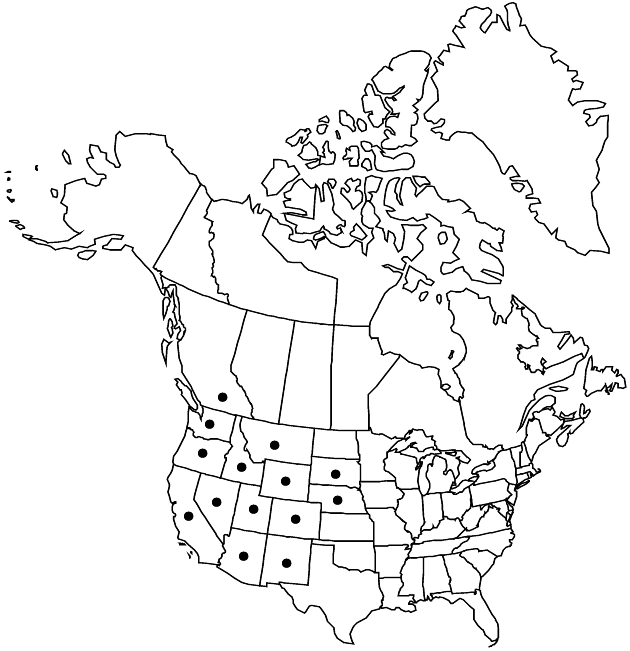Difference between revisions of "Chrysothamnus viscidiflorus"
Trans. Amer. Philos. Soc., n. s. 7: 324. 1840.
FNA>Volume Importer |
RevisionBot (talk | contribs) m (Bot: Adding category Revised Since Print) |
||
| (7 intermediate revisions by 3 users not shown) | |||
| Line 8: | Line 8: | ||
}} | }} | ||
|common_names=Yellow or sticky-leaf rabbitbrush | |common_names=Yellow or sticky-leaf rabbitbrush | ||
| − | |basionyms={{Treatment/ID/ | + | |special_status={{Treatment/ID/Special_status |
| + | |code=E | ||
| + | |label=Endemic | ||
| + | }} | ||
| + | |basionyms={{Treatment/ID/Basionym | ||
|name=Crinitaria viscidiflora | |name=Crinitaria viscidiflora | ||
|authority=Hooker | |authority=Hooker | ||
| + | |rank=species | ||
| + | |publication_title=Fl. Bor.-Amer. | ||
| + | |publication_place=2: 24. 1834 | ||
}} | }} | ||
|synonyms= | |synonyms= | ||
| Line 23: | Line 30: | ||
-->{{Treatment/Body | -->{{Treatment/Body | ||
| − | |distribution= | + | |distribution=B.C.;Ariz.;Calif.;Colo.;Idaho;Mont.;N.Mex.;Nebr.;Nev.;Oreg.;S.Dak.;Utah;Wash.;Wyo. |
|discussion=<p>Subspecies 5 (5 in the flora).</p> | |discussion=<p>Subspecies 5 (5 in the flora).</p> | ||
|tables= | |tables= | ||
| Line 71: | Line 78: | ||
-->{{#Taxon: | -->{{#Taxon: | ||
name=Chrysothamnus viscidiflorus | name=Chrysothamnus viscidiflorus | ||
| − | |||
|authority=(Hooker) Nuttall | |authority=(Hooker) Nuttall | ||
|rank=species | |rank=species | ||
| Line 78: | Line 84: | ||
|basionyms=Crinitaria viscidiflora | |basionyms=Crinitaria viscidiflora | ||
|family=Asteraceae | |family=Asteraceae | ||
| − | |distribution= | + | |distribution=B.C.;Ariz.;Calif.;Colo.;Idaho;Mont.;N.Mex.;Nebr.;Nev.;Oreg.;S.Dak.;Utah;Wash.;Wyo. |
|reference=None | |reference=None | ||
|publication title=Trans. Amer. Philos. Soc., n. s. | |publication title=Trans. Amer. Philos. Soc., n. s. | ||
|publication year=1840 | |publication year=1840 | ||
| − | |special status= | + | |special status=Endemic |
| − | |source xml=https:// | + | |source xml=https://bitbucket.org/aafc-mbb/fna-data-curation/src/2e0870ddd59836b60bcf96646a41e87ea5a5943a/coarse_grained_fna_xml/V19-20-21/V20_418.xml |
|tribe=Asteraceae tribe Astereae | |tribe=Asteraceae tribe Astereae | ||
|genus=Chrysothamnus | |genus=Chrysothamnus | ||
| Line 89: | Line 95: | ||
}}<!-- | }}<!-- | ||
| − | -->[[Category:Treatment]][[Category:Chrysothamnus]] | + | --> |
| + | |||
| + | [[Category:Treatment]] | ||
| + | [[Category:Chrysothamnus]] | ||
| + | [[Category:Revised Since Print]] | ||
Latest revision as of 18:25, 6 November 2020
Shrubs, 10–120 cm; with woody, branched caudices, bark whitish tan, becoming gray, flaky and fibrous with age. Stems ascending, green, soon becoming tan, glabrous or puberulent, sometimes resin-dotted, often resinous. Leaves ascending, spreading, or deflexed; sessile; blades with evident midnerves plus sometimes 1–2 pairs of smaller, collateral nerves, linear to lanceolate, 10–75 × 0.5–10 mm, flat or sulcate, often twisted, margins often undulate, sometimes ciliate, apices acute to apiculate, faces glabrous or puberulent. Heads in dense, rounded cymiform arrays (to 7 cm wide), not overtopped by distal leaves. Involucres cylindric to obconic or campanulate, 4–7 × 1.5–2.5 mm. Phyllaries 12–24 in 3–5 series, in spirals or weak vertical ranks, mostly tan, green to brown subapical patch often present, midnerves usually evident (at least distally), linear-oblong, lanceolate to elliptic or obovate to spatulate, 1–5 × 0.5–1.2 mm, unequal, chartaceous, margins scarious, eciliate or ciliolate to erose-ciliolate, flat or convex, sometimes weakly keeled, apices acute to obtuse or rounded, sometimes apiculate, flat, faces glabrous or puberulent. Disc florets (3–)4–5(–14); corollas 3.5–6.5 mm, lobes 0.7–1.7 mm; style branches 2.2–3.2 mm (exserted beyond spreading corolla lobes), appendages 0.8–1.5 mm (length shorter than stigmatic portion). Cypselae tan to reddish brown, turbinate, 2.5–4.2 mm, ± 5-angled, moderately to densely hairy; pappi tan, 3.5–6 mm.
Distribution

B.C., Ariz., Calif., Colo., Idaho, Mont., N.Mex., Nebr., Nev., Oreg., S.Dak., Utah, Wash., Wyo.
Discussion
Subspecies 5 (5 in the flora).
Selected References
None.
Lower Taxa
Key
| 1 | Leaves flat, glabrous; corollas 3.5–4.5 mm; nc Arizona | Chrysothamnus viscidiflorus subsp. planifolius |
| 1 | Leaves twisted or hairy, or corollas 3.5–6.5 mm; w United States | > 2 |
| 2 | Distal stems, and frequently leaves, hairy | > 3 |
| 2 | Stems glabrous; leaves glabrous, margins ciliate | > 4 |
| 3 | Stems greenish, hirtellous to puberulent; leaves green, 3- or 5-nerved, 2–6 mm wide, abaxial faces hirsute to hirtellous, adaxial usually glabrous | Chrysothamnus viscidiflorus subsp. lanceolatus |
| 3 | Stems and leaves grayish green, densely puberulent; leaves 1–2(–4) mm wide; 1-nerved (sometimes 3-nerved proximally) | Chrysothamnus viscidiflorus subsp. puberulus |
| 4 | Leaves 0.5–1 mm wide; florets 3–4(–5); involucres ± turbinate | Chrysothamnus viscidiflorus subsp. axillaris |
| 4 | Leaves 1–10 mm wide; if 1 mm wide, involucres narrowly cylindric, and florets 4–14 | Chrysothamnus viscidiflorus subsp. viscidiflorus |